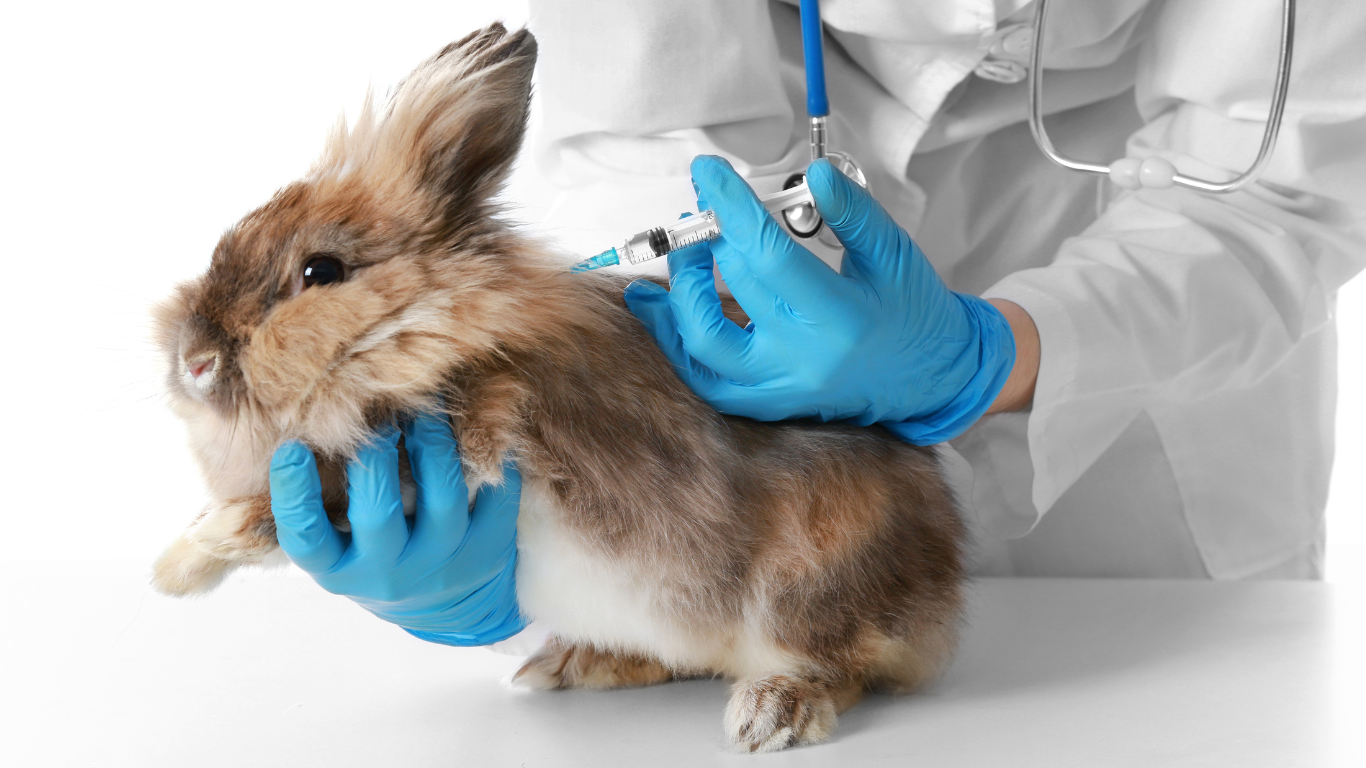
Rabbit Vaccines: Many pet owners are surprised to find out that rabbits as pets weren’t looked at for vaccinations until 2021. Whether you just got a rabbit as a pet or you already have one, it’s important to know how vaccinated it is, what vaccines are available, and how to keep it from getting sick.
Contents
Do Rabbits Need to be Vaccinated?
With the rise of new diseases, it is becoming common for veterinary clinics all over the United States to vaccinate pet rabbits.
What Is a Vaccine?
A vaccine is a biological substance that makes the body’s immune system work harder to fight off certain diseases. A vaccine could have a virus or bacteria that has been weakened or killed, or it could have a part of it like a protein. Most people get a flu shot and a shot against other seasonal viruses each year. Vaccinations for pets are usually given soon after birth or when they reach a certain age to protect them from common viruses.
RHDV and RHDV2 in Rabbits
The United States Department of Agriculture (USDA) permitted pet rabbits to use the Rabbit Hemorrhagic Disease Virus (RHDV2) vaccine in an emergency in 2021. Even though RHVD has been common in the U.S. since 2010, a new type of RHDV that is more dangerous for pet rabbits has emerged. RHDV2 is a calicivirus, which is a type of virus in the family Caliciciviridae. It attacks the liver of rabbits, is very contagious, and kills them. Symptoms can include sudden fainting, death, and a lot of bleeding.
Only wild and domestic rabbits can get RHDV. It can’t be passed from rabbits to other pets, like dogs and cats, but these pets can bring the virus into the house if they get it outside.
The new RHDV version, RHDV2, was found in the United States in 2018. By 2020, it had spread to wild cottontails and jackrabbits. Officials think it will eventually become endemic, or common, in North America. This is why the vaccine came out in 2021, and pet owners are strongly encouraged to get their rabbits vaccinated against the strain. RHDV2 has been found in 23 states as of August 22, 2022, mostly on the west coast and some Southern states.
RHDV can live in the wild, be brought into your house on your clothes or shoes, and easily spread to your rabbit. It can also spread from an infected rabbit to another rabbit or your rabbit if it comes in contact with an infected rabbit’s blood, urine, or feces.
The new version of the virus is easy to spread, has a high resistance level, and kills 70–100% of infected rabbits within a few days. Talking to your vet about vaccinating your rabbit is important because there aren’t many ways to treat this virus. When the vaccine is given correctly, it protects 90% of people.
Read More: Pet Insurance: Is It Worth Investing In?
Which Rabbit Vaccines Are Available
RHDV2 Vaccine
In 45 states in the U.S., you can get the RHDV2 vaccine right now. The FDA has not fully approved the vaccine, but early research shows it is safe and works well to keep people from getting sick.
The vaccine can cause mild swelling where it was injected, mild fever, and tiredness for a few days afterward.
Myxomatosis Vaccine
Myxomatosis is a disease that kills pet rabbits, and there is no treatment for it right now. Some of the signs are swelling, a high fever, feeling tired, and having trouble breathing. Fleas, black flies, fur mites, or indirect contact with infected rabbits spread myxomatosis. People in Oregon, California, and Mexico have said that their pet rabbits had Myxomatosis.
In the United States, rabbits can’t get a shot against the Myxomatosis virus. The vaccine is available in Europe and the U.K., but the USDA has not approved it.
Rabbit Vaccination Schedule
The RHV2 vaccine and annual booster shots must be given twice, at least three weeks apart. To keep immunity up, you need a booster shot once a year. When rabbits are 28 days old, this vaccine is considered safe. Talk to your vet about your rabbit’s vaccination schedule and the recommended vaccines.
Preventing Disease in Rabbits
Even though the RHDV2 vaccine is important, practicing good biosecurity is even more important because no vaccine is 100% effective.
RHDV2 is very easy for rabbits to catch from the environment. Rabbits with RHDV2 can spread it through their urine, feces, blood, and other secretions for up to a month. The virus can get into other rabbits’ mouths, noses, or eyes. RHDV2 can be spread by contacting dead animals, rabbit fur, food, water, clothing, insects, or other animals that eat rabbits. RHDV2 is also resistant to the environment. It can stay alive on surfaces like clothing and grass for up to a month when not in a host.
It’s best not to let your pet rabbit out in places where wild rabbits like to hang out. You shouldn’t wear outdoor shoes where your rabbit is and shouldn’t let your rabbit get close to those shoes. Do not give your rabbit grass, weeds, or flowers from places outside where wild rabbits like to hang out. Before touching a rabbit, you should always wash your hands.
If a rabbit is infected with RHDV2 and you need to clean the rabbit’s home, you must first remove all organic material (like bedding, feces, fur, etc.) before disinfecting.
Clean things well with soap and water after taking things out of their cage. Items should be completely covered or soaked in diluted bleach. To do this, add 12 cups of 6% or 8.25% bleach to 1 gallon of water. Please let it sit for 5 minutes before rinsing it with water, and wear rubber gloves, eye protection, and other protective gear. Virkon and Rescue are two other disinfectants you can use. The USDA website has a full list of disinfectants and how to use them.
If you live where Myxomatosis is common, you should give your rabbit Revolution once a month to keep fleas and fur mites away. Also, use mosquito netting to protect the rabbit’s outdoor play area if the rabbit spends some time outside.
Do not let your pet rabbit talk to wild rabbits or go near them.
If you have questions or concerns about the vaccine, insect control, or cleaning/sanitizing product, work closely with your veterinarian to determine the best next steps.
FAQs
Is there a better time of year to give vaccines?
As long as you keep up with booster shots, the best time of year to give the vaccine is always the same, so your protection doesn’t stop.
Do show rabbits need more vaccines than other rabbits?
Show rabbits don’t need extra vaccines, but keeping them on a good external parasite treatment like Revolution is a good idea.
